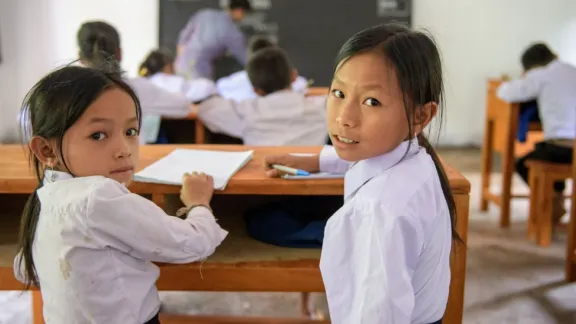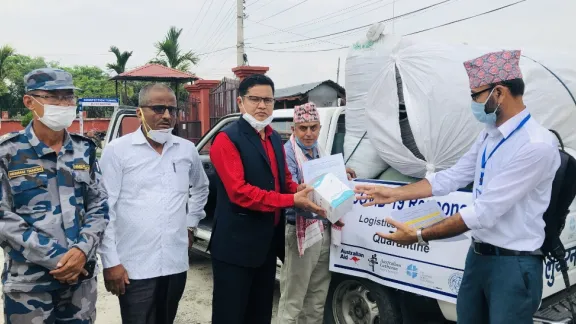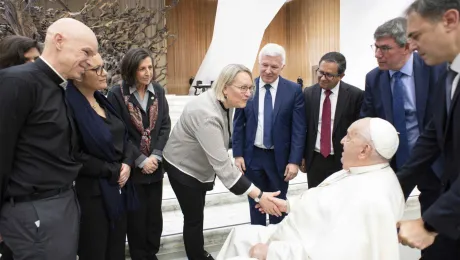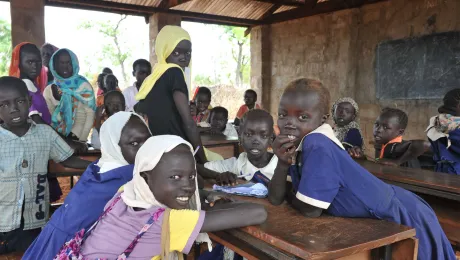What We Do
We believe that equitable access to quality services, such as education, water, energy, and health care, is a right that must be claimed by women and men, girls and boys to enjoy a better quality of life, to claim and access their human rights and to fulfill their full potential.
The provision of such services is fundamentally the duty of local and national authorities.
When service provision breaks down or is unavailable, particularly in times of acute crisis, World Service will step in to provide life-saving, humanitarian assistance to people affected by displacement, where we can best add value.



In all contexts, we are committed to never filling service gaps for any longer than necessary and will prioritize bringing rights-holders and duty-bearers together so that local communities claim and gain improved access to quality services, in accordance with fundamental human rights principles. In this respect, we will particularly target improving communities’ access to water and sanitation, to adequate education, to affordable energy, and to mobile and internet connectivity. Where needed and possible, we work diligently to link communities with other specialized NGOs and private institutions for joint advocacy and for the pooling of our collective technical expertise so as to maximize overall outcomes in the short, medium, and long-term.
When crisis hits or a situation is chronic due to poor, failing or contested governance, World Service meets basic needs through the distribution of food, water, sanitation, shelter, or core relief items, both in-kind and through cash transfer and vouchers. We lobby for and provide welcoming reception services and support a fair registration process to create a safe environment for people fleeing conflict or other disasters.
We uphold the right of education through the direct provision of basic education services in situations of displacement where governments are unable to provide adequate education. We will uphold people’s right to health until they are able to access regular quality services by offering health care interventions if appropriate or by linking those in need with specialized health care NGOs and other private healthcare providers.
As national and international humanitarian responses are increasingly reoriented towards the integration of displaced people within host communities, we are moving away from camp management to focus on the strengthening of service provision at the community level.
We support both formal and informal education. Where displaced and host communities are taught jointly, we support local communities and authorities to improve school infrastructure and teaching capacities to promote social cohesion and peaceful co-existence. We also support vocational training schemes for young people and other vulnerable groups.
We work to improve equitable access to safe and sufficient water and sanitation. This includes improving infrastructure and building community capacity to manage and maintain these installations, in partnership with local authorities. We also work with communities and authorities to reduce the occurrence of waterborne diseases through hygiene promotion, and to strengthen community access to quality health care. Community access to renewable energy sources and internet services will receive more attention. These services are key to helping people out of poverty and isolation, boosting both livelihoods opportunities and social cohesion.
Access to quality services depends strongly on influencing relevant policy and legal frameworks, and enforcing quality standards. We work constructively with governments and duty-bearers and hold them accountable for their commitments to their populations, including access to education, water, health care, and affordable energy sources.
We work with private actors and lobby for mobile and internet connectivity guided by adequate data protection measures, including the protection of people’s right to information.
As World Service is held in high regard by communities, governments, and others alike, we are well positioned to work from an advocacy perspective whenever possible, locally, nationally and internationally. We will continue to press for people’s access to an adequate standard of living, to education, and to other basic rights. We do this both with and on behalf of the people and communities themselves, using our international status as a respected actor within civil society to advance their rights, and in national and international forums, such as the UN Human Rights Council, influential governments, and the private sector.
Even in humanitarian crises, we are conscious that our role as an NGO is not that of a long-term service provider. Instead, we look to hand this over to appropriate duty-bearers.
Contact
Get Involved
Share with us your stories, photographs and insights using the #LWF



